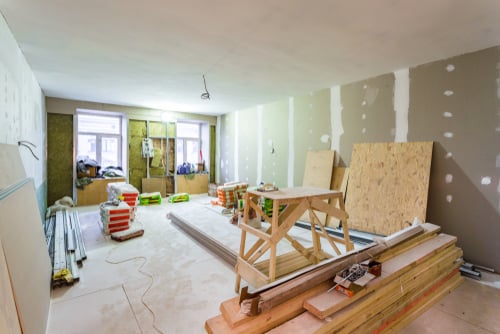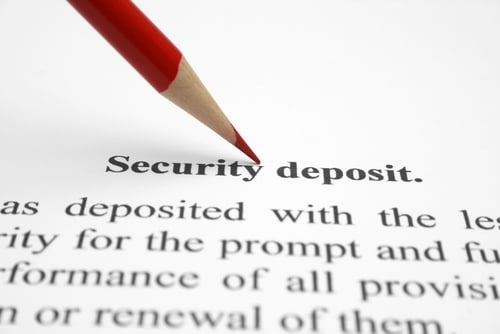Suppose you find a rental home you love, but it doesn’t quite feel like home. Whether it’s the wall colors, appliances, or light fixtures, making large changes in a rental home can be difficult without losing your security deposit. So, what can you do to make your space feel more like you? Read along as we discuss the importance of talking with your landlord and how to make changes in a rental home without losing your security deposit.
Contents of This Article:
- Can You Make Changes to a Rental?
- What Types of Changes Can You Make?
- What Puts You at Risk of Losing Your Security Deposit?
- Importance of Reading Your Lease Agreement
- Talk to Your Property Manager About Making Changes
Can You Make Changes to a Rental?
Living in rental properties is convenient but less personable than a home you own. That said, if you want to make changes to your rental property, it’s essential to know that you may be at risk of losing your security deposit. However, it generally depends on your landlord, lease agreement, and property type. Most Washington DC rental property management companies will work with tenants to ensure compliance while personalizing a property.

While you can decorate your rental property however you want, some tenants want to make more extensive changes. For instance, you may consider painting walls, swapping out appliances, and upgrading some existing fixtures to make the property feel more like home. However, is this allowed in a rental property?
Ultimately, it depends on what your landlord says and what changes you want to make. First, you must check with your landlord or property management company if you want to make changes. Next, we’ll go over some generally safe options if you want to make your rental home more personal.
What Types of Changes Can You Make?
The changes you can make to a rental are generally limited. After all, you don’t own the property–your landlord does. So, they get to decide whether your requests are reasonable or not. For instance, you can decorate the property however you want, but can you paint the walls or change the flooring? It all depends.
Luckily, there are several changes you can make with your landlord’s permission. Here are a few common examples.
Examples of Potential Rental Property Changes
- Painting Walls– Your lease or your landlord may allow you to paint the walls of your rental. However, they might want to approve the color or choose a neutral paint for you to use.
- Replacing Fixtures– Replacing small fixtures like door knobs, showerheads, or light fixtures are small changes your landlord will likely approve. However, you may have to switch them back before you move out.
- Upgrading Appliances– Although expensive, if you find that your rental has outdated appliances, you could ask your landlord if you could upgrade them. Then, you may even get a rent discount for increasing the property’s value.
- Temporary Wallpaper– If you cannot paint the walls in your rental, you may consider using temporary wallpaper instead. That way, it’s less permanent, and your landlord will likely be more willing to approve this change.
- Removable Flooring– Similar to temporary wallpaper, you can invest in peel-and-stick flooring to switch up the look of your rental.
- Installing a Security System– Safety and security in a rental are essential. As such, ask your landlord about installing a security system. They may think it’s a great idea, too!
- Landscaping Changes– Changes to the outside of your rental property are generally pretty easy. For instance, you can spruce up your rental by planting flowers or personalizing your outdoor decor.
Not every landlord will allow you to make these adjustments in your rental home. After all, painting the walls and upgrading appliances are somewhat large changes. As a result, you’re likely to lose your security deposit if they’re done wrong or without your landlord’s permission.
What Puts You at Risk of Losing Your Security Deposit?
Smaller changes like replacing fixtures and temporary wallpaper are easier to remove or replace when you move out. As such, landlords will likely be more willing to accept those types of changes in a rental property. On the other hand, painting the walls or replacing appliances is quite significant, and your landlord might prefer a professional to make those changes instead.

However, even if you plan on making minor changes, you must read your lease and talk to your landlord. If you don’t, you could risk losing your security deposit. For instance, painting the walls bright purple without your landlord’s permission and leaving them like that when you leave is almost a guaranteed way to lose your deposit.
Additionally, damaging the property in any way while making approved changes can be grounds for losing your security deposit. For instance, leaving paint drips on the hardwood floor after painting or damaging the walls with wallpaper can pose an issue.
Ultimately, your landlord is more likely to accept upgrades or changes that increase the property’s value. For instance, newer appliances or upgraded fixtures can benefit you and your landlord. In fact, they may be willing to pay for them or decrease your rent if you do the work.
Importance of Reading Your Lease Agreement
Before making any changes to a rental property, it’s crucial to read your lease agreement. You’ll find in the lease agreement any rules or expectations for how to treat the property. For instance, your landlord or property manager will generally indicate what changes can be made and what can’t.

Even if your lease doesn’t say anything about upgrading the property, it’s important to run it by your landlord or property manager. For instance, it might not specify that you can’t paint the walls or replace the flooring. However, that doesn’t mean you can go ahead and make those changes without permission.
Ultimately, you must get approval from your landlord or property manager to avoid damages and breaking your lease terms.
Talk to Your Property Manager About Making Changes
If you’re considering making a few slight changes to your rental property, read your lease agreement first. If you think the changes are reasonable, you’ll want to double-check with your landlord or property manager. After all, you don’t want to risk losing your security deposit. If you’ve gotten permission, assure your landlord or property manager that you’ll be cautious with any changes you make to the property.
Additionally, remember that your landlord is more likely to approve changes that increase the property’s value. Therefore, lower-cost, energy-efficient, value-increasing improvements are great for you and your landlord. However, check with your landlord or local property manager before making significant changes.
Need More Advice? contact us today!
Bay Property Management Group offers comprehensive rental management services near Baltimore, Philadelphia, Northern Virginia, and Washington, DC. If you’re looking for a new rental home or professionals to manage your properties, BMG can help! Contact us today to learn more about our services and how we can help your rental business succeed.
